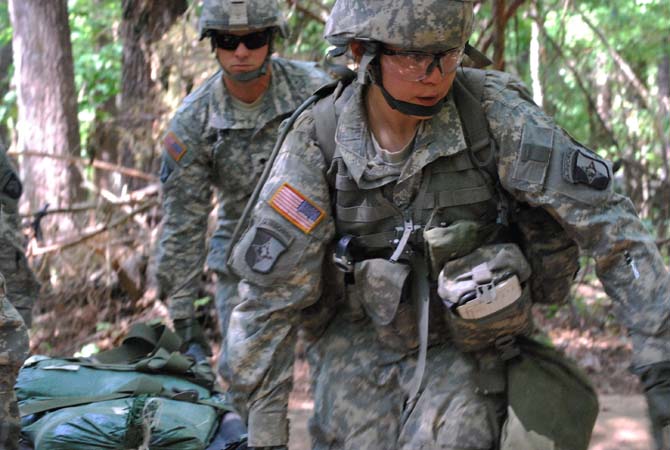Secretary of Defense Leon Panetta and General Martin E. Dempsey have announced their lifting of the 1994 ban on women in combat roles.
This isn’t the first time the discussion of women’s roles in the military has taken place.
The issue is not whether women should be in the military or are in danger or at risk during combat, but whether they should hold jobs that require directly seeking, engaging and destroying enemy combatants.
It would be foolish to take some of the past inaccurate statements about this topic and use them for the basis of a decision.
It is also safe to say that it doesn’t matter what my opinion is because the Department of Defense is going to do whatever it pleases.
The first misconception involving this issue comes from the term “front line.” There is no such thing. We do not currently fight any symmetrical wars that define a clear front line. Instead, we are at war with illegal combatants who strike at random, which places civilians and military men and women at risk.
To say that women in the service have never been or are not at risk of being in combat currently is false.
Of course, there are certain jobs that require the direct confrontation of enemy forces, such as the infantry, a traditionally male fraternity that has existed as long as the Armed Forces have, or any elite special operations groups from various branches.
This entire concept is based on gender equality.
The physical difference between males and females is the most prevalent objection to women serving in physically demanding combat roles.
According to a study done between eight males and eight females at McMaster University’s Department of Physical Education, women were approximately 52 to 66 percent as strong as men in the upper and lower body, respectively.
Currently, women are tested on a lighter scale than men in the Armed Forces. An appropriate response to incorporating them into traditionally male roles would be to have them meet the same standard of fitness.
This would of course create a disproportional percentage of male to female soldiers in units, because fewer females would be able to meet the standard normally attributed to men.
Women in the Armed Forces currently make up 14.5 percent of active duty personnel. According to the Department of Defense’s last annual report in 2011, one in three women were victims of sexual assault and 180 times more likely to have been a victim of sexual assault than to have died while deployed in the last 11 years to Iraq or Afghanistan.
According to the Pentagon’s Sexual Assault and Response Office, only 14 percent of sexual assaults are reported. This number is not exclusively women, but according to the report, they make up the vast majority with the perpetrator being male.
Including women in high-stress, physically demanding, long-term deployment jobs will statistically be bad for females in the service in regard to sexual harassment cases.
Considering the Department of Defense has failed to solve the number of sexual harassment cases per year, it is safe to say this lifting of the ban will most likely increase the numbers.
Many advocates of gender equality for the military use Israel as a standard.
Women, like men, are drafted into the military in Israel. However, they only serve for 21 months of the required 36 months for men.
Marriage, pregnancy and religious convictions are exemptions that remove their requirement for draft, resulting in fewer women serving than men.
General Yitkah Gershon, a 32-year veteran of the Israel Defense Forces suggests slowly integrating females into instructor roles instead of thrusting them into special operations.
Israel is also a poor comparison to use because it fights and wages war out of necessity, being surrounded by hostile groups and nations.
But now, with the lifting of the combat ban on women, Panetta said the Selective Service in the U.S. will have to adjust its draft requirements to include women as well. If not, the program would need to be abolished entirely.
I am sure the feminists and gender equality advocates will be thrilled at the death of chivalry and proposition of women drafted into combat or non-combat roles.
Welcome to the era of progressivism.





